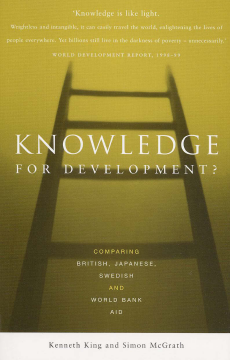
Additional Information
Book Details
Abstract
In 1996, the World Bank President, James Wolfensohn, declared that his organization would henceforth be 'the knowledge bank'. This marked the beginning of a new discourse of knowledge-based aid, which has spread rapidly across the development field. This book is the first detailed attempt to analyse this new discourse.
Through an examination of four agencies -- the World Bank, the British Department for International Development, the Japan International Cooperation Agency and the Swedish International Development Cooperation Agency -- the book explores what this new approach to aid means in both theory and practice. It concludes that too much emphasis has been on developing capacity within agencies rather than addressing the expressed needs of Southern 'partners'. It also questions whether knowledge-based aid leads to greater agency certainty about what constitutes good development.
Kenneth King is Professor of International and Comparative Education and Director of the Centre of African Studies, University of Edinburgh. He is the author or editor of several books , including 'Aid and Education' and 'Changing International Aid to Education' (edited with Lene Buchert).
Simon McGrath has been a research fellow at the Centre of African Studies, and became Research Director at the Human Sciences Research Council in Pretoria, South Africa in October 2002.
Both authors have published extensively in African Studies and International Comparative Education and have been researching development cooperation for a number of years.
'In this excellent book the authors present a detailed analysis and a balanced assessment of the prospects for knowledge-based aid to achieve the goal of improving aid-effectiveness. Based on conceptual framework setting and a close examination of actual experience they reach the conclusion that success depends on reconceptualizing aid itself, in the direction of capacity building in poor countries.'
Ravi Kanbur, Cornell University
'Knowledge management is popular. Aid agencies talk easily of sharing stories, communities of practice and double-loop learning. But are they ready to sacrifice a preoccupation with results and a concern to disseminate 'best-practice' - in favour of real partnership and mutual learning across divergent networks? McGrath and King are sceptical. Their case studies and their thesis challenge all of us involved in the production, sharing, and use of knowledge.'
Simon Maxwell, Overseas Development Institute, and President of the Development Studies Association of the UK and Ireland
Table of Contents
| Section Title | Page | Action | Price |
|---|---|---|---|
| Cover | Cover | ||
| Contents | v | ||
| Acknowledgements | vii | ||
| Abbreviations and acronyms | ix | ||
| ONE: Researching knowledge-based aid | 1 | ||
| Setting the scene | 1 | ||
| Research questions | 3 | ||
| A new way of researching; a new way of working | 3 | ||
| The structure of the book | 15 | ||
| Notes | 16 | ||
| TWO: The new aid agenda | 18 | ||
| The changing fashions of development co-operation | 18 | ||
| Aid discourse at the start of the new millennium | 25 | ||
| Notes | 30 | ||
| THREE: Knowledge for development | 32 | ||
| The origins of knowledge-based aid | 32 | ||
| Knowledge-based aid | 37 | ||
| Alternative accounts of knowledge and development | 49 | ||
| A concluding comment | 52 | ||
| Notes | 53 | ||
| FOUR: The World Bank or the knowledge bank? | 55 | ||
| The discovery of knowledge-based aid in the World Bank | 55 | ||
| The World Bank’s older knowledge strategies | 56 | ||
| The World Bank’s vision of knowledge for development | 58 | ||
| Revising the strategy: the Ramphele review and a shifting focus for the knowledge bank | 65 | ||
| The new architecture of the knowledge bank | 70 | ||
| The knowledge bank in practice: assessing the extent of transformation | 90 | ||
| Notes | 97 | ||
| FIVE: From information management to knowledge sharing: DFID’s unfinished revolution | 99 | ||
| DFID’s knowledge discourses | 99 | ||
| DFID’s knowledge projects | 109 | ||
| DFID’s knowledge practices | 118 | ||
| How should we judge DFID’s approach to knowledge and development? | 123 | ||
| Notes | 126 | ||
| SIX: Knowledge, learning and capacity in the Swedish approach to development co-operation | 130 | ||
| Historical overview | 130 | ||
| Sida’s discourses of knowledge, learning and capacity | 133 | ||
| Sida as a generator of development knowledge | 143 | ||
| Sida’s initiatives to support knowledge, learning and capacity development | 145 | ||
| Knowledge and learning in practice | 147 | ||
| Conclusion | 152 | ||
| Notes | 153 | ||
| SEVEN: Experience, experts and knowledge in Japanese aid policy and practice | 155 | ||
| Japan’s own experience for development | 156 | ||
| Japan’s multiple external sources of development expertise | 163 | ||
| Sources of policy knowledge in Japanese development assistance | 170 | ||
| Knowledge-sharing initiatives in a culture of valuing experience | 173 | ||
| Knowledge management in JICA: a new approach | 176 | ||
| Other mechanisms for sharing development knowledge | 186 | ||
| Conclusion on sharing expertise for development | 189 | ||
| Notes | 190 | ||
| EIGHT: Conclusions and implications for knowledge, aid and development | 196 | ||
| Where does knowledge-based aid come from, and is it just a passing fashion? | 196 | ||
| Does knowledge-based aid work? | 197 | ||
| Knowledge-based aid or learning-led development? | 208 | ||
| Knowledge-based aid and knowledge, aid and development: some concluding thoughts | 209 | ||
| Bibliography | 213 | ||
| Index | 230 |
